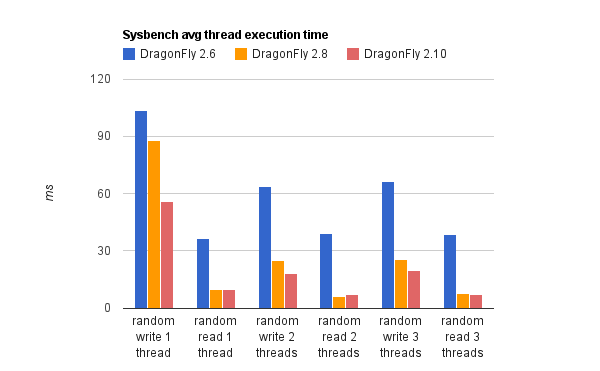I love graphs. Jan Lentfer made some! Both of these show recent speed improvements in DragonFly – especially some spectacular results from swapcache(8) and the recent NCQ tagging improvements. (Note that only the third graph represents the NCQ improvements; the first two graphs were done before.)
The first one is a comparison of pgbench running on the same hardware twice – once with the 2.8 release of DragonFly, and once with a recent 2.9 version. 2.9 is definitely looking to be faster than 2.8.
 Next up is a 2.9 system run with and without swapcache, showing an astounding difference between the two. It’s pretty clear just how much performance improvement you can get from swapcache… (see Jan’s notes on the setup after the graphic.)
Next up is a 2.9 system run with and without swapcache, showing an astounding difference between the two. It’s pretty clear just how much performance improvement you can get from swapcache… (see Jan’s notes on the setup after the graphic.)

Jan’s notes, from EFNet #dragonflybsd on IRC:
15:08 < lentferj> these are SELECT-Only tests
15:09 < lentferj> JustinS: it’S important to note, that the database is 2,5x
bigger than RAM on the swapchache test
15:11 < lentferj> JustinS: I did a Select-Only ramp-up of 30 minutes to get
caches and swapcache filled
15:12 < lentferj> JustinS: and then I ran
15:13 < lentferj> for i in 1 2 3 4 6 8 12 16 24 32; do
/usr/lib/postgresql/8.4/bin/pgbench -U pgsql -h atom -s 400
-S -c “$i” -T 600 pgbench; done
15:13 < lentferj> so, select only pgbench for 10 minutes each
15:13 < lentferj> with increasing numbers of client
15:14 < lentferj> pgbench on another box, 100MBit switched network
15:15 < lentferj> JustinS: the first graph (2.8.2 vs current) is the same w/ a
database that fits in RAM entirely
15:15 < lentferj> so measuring concurrency performance (w/o I/O)
15:17 < lentferj> the swapcache comparison was on a 2GB box with a 5GB database
and 16GB swapcache (INTEL) attached to a sili card
15:17 < lentferj> on a atom 330 :)
Now, here’s testing with the recent NCQ tagging update for AHCI:

These results are astonishing. Please, someone compare with other operating systems!
Here’s the stats for this last test:
- 5.6GB database, system w/ 2GB RAM –> io benchmark
- pgbench with increasing no of client 1->32, SELECT-Only Mode
- sili controller Dawicontrol DC-3410 SATA PCI controller which is using a Silicon Image 3124-2 chip
- 2 Seagate Barracuda ES.2 250GB SATA II disks
- lvm stripe over those disks
- postgresql.conf is default, except shared_buffers set to 512MB and effective_cache_size to 1024MB
- atom330 on a Foxconn mobo
- SSD is SATA INTEL SSDSA2M040 2CV1





